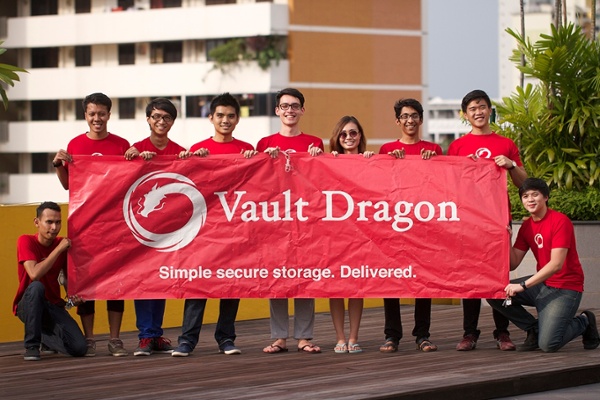Ching-Tse Tseng was a Taiwanese foreign student studying in Singapore when he realised that an everyday problem could form the basis of a great business. It let him to co-found Vault Dragon, a startup that secured record investor interest after graduating from the JFDI Accelerate program, writes David Ongchoco.

During his summer vacations, Ching would go back Taiwan so he needed to find storage. Unfortunately, all the storage facilities were too expensive, too big or too far from where he lived. There were just too many complications for a foreign student who just wanted to store his things in a safe place.
This would be the frustration that Ching would draw from when he decided to leave his job at PWC after one year to start Vault Dragon, Asia’s first valet storage company. He shared, “I wanted to come up with something that was more durable, more convenient and more secure.”
1. Find an ecosystem that can help you with your goals
While Ching had come from a business background, Ching wasn’t super familiar with how to run a startup. But he went out of his way to join programs like the Founder Institute.
In fact, it was the local leader of Founder Institute, Jeffrey Paine who recommended that Ching and Vault Dragon join JFDI’s Accelerate Program. Ching recalls receiving a lot of mentorship and support during his time at JFDI.
He shared, “They put us at the center of the ecosystem. They showered us with a lot of attention and access to potential investors. We met almost all of our investors during the 3 months at JFDI. We were really lucky. Without JFDI, we wouldn’t have been able to raise money and gain the trust of all the investors.
2. Use the lean startup to validate your ideas and assumptions
Although Vault Dragon has a unique business model that focuses more on optimizing the logistics of storage, going through the JFDI program helped them learn more about the lean startup methodology and learn from Ray Wu, one of the Lean Startup Machine ambassadors in Asia.
Ching shared, “The Lean Startup Model taught us how to be very systematic with things. It taught us how to get out of the building and talk to customers. It taught us how to look for paying customers. It was really about getting the idea, the MVP and the product market fit right.”
3. Create a defensible idea
While the initial B2C model of Vault Dragon was an immediate business success since storage is something a lot of students, immigrant workers and expats need, it wasn’t a very defensible idea. Ching himself admitted how, “Our B2C model wasn’t that defensible because anyone with some money to buy a box and a warehouse could do it.”
So Ching and his team decided to explore the B2B segment as well. After going through a lot of customer discovery, testing and research, they decided to settle with working with specialists like doctors who really needed Vault Dragon’s storage services.
In the last 9 months, Vault Dragon has developed their medical record scanning capabilities and has scanned over 300,000 patient records. Ching shared, “Scanning is really really hard and expensive; this builds the barrier to entry for anyone who wants to compete with us.”
4. Don’t do a startup…. But if you do, never give up
Ching shared how starting a successful startup is even harder than striking the lottery. He said, “If you want a real challenge, you can get it from starting a real company. If you work for another company, you only answer to one boss. Once you start a company, everyone is your boss. Your customers, employees and investors are your boss.”
However, Ching emphasized how if you do end up starting a company, his one advice is to, “Never give up.” He added, “The struggle is real. The sacrifices are immense. You have to hustle everyday, and you sacrifice your social life. I lost touch with my past friends. Your life is your startup.”
He added, “There are a million reasons why startups fail but I think the one reason why startups succeed besides hard work, timing and luck, is grit.”

Speaking of the JFDI Accelerate Program, our 2015B Applications are now open. Our mentors, founders and investors form the perfect ecosystem for your startup to succeed in Asia. More than 60% of our Accelerate startups receive seed funding.
 David Ongchoco is a content marketing intern for JFDI Asia. He currently studies at the University of Pennsylvania and runs an international nonprofit called YouthHack, which has a goal of helping students learn more about startups, technology and entrepreneurship. He also contributes for top publications like the Huffington Post, Technical.ly Philly and the Philippine Daily Inquirer.
David Ongchoco is a content marketing intern for JFDI Asia. He currently studies at the University of Pennsylvania and runs an international nonprofit called YouthHack, which has a goal of helping students learn more about startups, technology and entrepreneurship. He also contributes for top publications like the Huffington Post, Technical.ly Philly and the Philippine Daily Inquirer.

